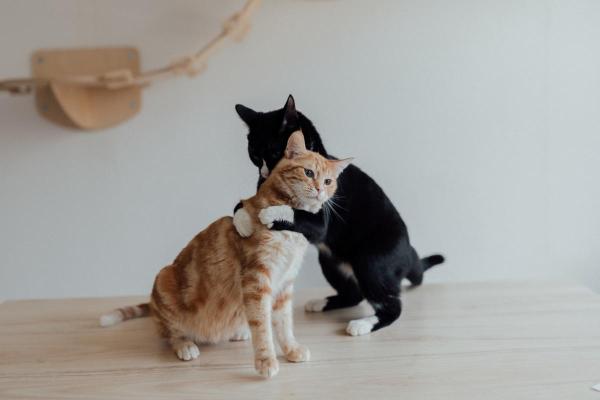My Cat Is Hissing at My Other Cat After a Spay



See files for Cats
When a cat comes back from the veterinarian, it is common for them to be a little shaken up by the experience. The stimuli of the car ride, being in a waiting room with other animals and the physical manipulation can be very stressful. In the case of being spayed, their stress can be even more acute. This is why it can be upsetting to see another cat in the home hissing at them after they have been through a traumatic experience. Since the spay changes their hormonal balance, it is possible the other cat is responding to these changes. AnimalWised finds out why my cat is hissing at my other cat after a spay.
Hormonal changes and territoriality
Although they both refer to procedures to prevent reproduction, it is important to note the differences between sterilization and spaying. Sterilization can be in many forms, including the use of contraceptive drugs which prevent fertilization by changing hormone production. Spaying requires an abdominal incision and the removal of the uterus and ovaries. For this reason, a spay is known as an ‘ovariohysterectomy’ and is more invasive than contraception.
If your cat is spayed, the other cats in the home will be able to smell a change in their hormone production. Since the reproductive hormones are largely created by the reproductive organs, their removal means their production will be minimized.
Cats have an acute sense of smell which they use to recognize other cats. Spaying can change their scent and the other cat may not recognize them after some time. It will take some days before the hormonal changes are complete, but often cats are separated after a spay to allow them time to heal and recuperate. The hissing might simply be due to the cat not recognizing them.
What to do if a cat is being territorial
It is important to provide cats with separate spaces and enough resources for both in order to encourage proper adaptation to the new situation. The newly spayed cat will need time separated from other cats in the home so they can heal and adapt to their changes.
Once the cat has healed, it is possible the other cats will accept her right away. This is not always the case. To err on the side of caution, we should reintroduce the cat as if she were a new addition to the home. We should slowly introduce her to the other cats, allow them to share spaces gradually and remove them if there are signs of aggression. Positive reinforcement in cats is required and we should provide plenty of affection to all the cats.
Learn more about this process with our article on how to introduce a new cat to another cat.
Olfactory exploration
We have said that castration can modify the cat's smell by stopping producing reproductive hormones. There are other reasons a cat's scent might be altered. After being at the veterinarian, they may have picked up other odors which can threaten other cats in the home. The scent of the animals which have previously occupied the clinic can be particularly problematic.
When the cat returns after their surgery, the other cat may hiss at her because they pick up on these smells. Especially if the cat is male, they can be very territorial. They may hiss and become aggressive until they can reestablish their territory and accept a group scent.
What to do about aggressive cats
Generally speaking, the cat's own scent should reestablish itself after some time. Any outdoor scents will soon dissipate, making it easier for the other cats in the home to accept her. In this way, we should be patient and separate them if the aggression poses a threat.
There are ways you can help to encourage this reestablishment of social harmony in the home. The use of synthetic pheromones can help a cat to feel relaxed, so we can spray the pheromones around the home to encourage peace. We should not directly spray the cat.
In the specific case of conflict between male cats and spayed females, various factors are at play. These include territorial dynamics, stress, perceptions of threat or social confrontations. An in-depth analysis of these elements can help develop a personalized management plan. This is aimed at mitigating episodes of aggression against other cats and promoting an environment in which both cats can coexist peacefully.

Changes in social dynamics
Spaying the cat may result in changes to the social dynamics that both cats had before the surgical intervention. Cats can establish very complex social dynamics. Taking into account how sensitive they are to change, it can be totally normal for the other to react aggressively to the new situation. Their emotional stability has been altered and this is how you respond instinctively.
What to do if the social dynamic changes
Again, introducing the newly sterilized cat gradually will help them adapt to their new social dynamics without having to resort to aggression. Providing plenty of environmental enrichment to cats and ensuring all cats are supported is important. It is also vital to know that cats will establish the hierarchy on their own, so we should afford them an adaptation period to resettle.
Stress or changes in the environment
We have mentioned that cats are sensitive to change. Changes in the home environment can trigger hissing and aggression between cats. When a cat has been spayed, the home and routine are disrupted. When the other cat sees their companion now has a big collar around their neck and is behaving differently, it can cause them to be confused and feel insecure.
Other changes such as moving home or changes to the furnishings can accompany the spay. It could be that these changes combined cause upset and result in the cat hissing when the spayed cat comes home. In these cases, it is usually because the cat has other causes of stress, but these new changes are tipping the balance. Such causes could be due to a traumatic past, poor socialization or even understimulation.
It is also possible the other cat has been to the veterinarian before and had to wear the Elizabethan collar to stop them accessing a part of their body. Seeing the other cat with this device might result in a traumatic memory which causes them to be upset.
What to do if a cat is stressed
When the Elizabethan collar is the sole cause of the hissing, it might be enough to separate them until the collar can be removed. However, it should provide us an opportunity to assess their general well-ebing for sensitivity to stress. We can look at the home environment and their routine to see what might be causing the cat to be stressed.
Poor diet, lack of stimulation, boredom, loud noises and many other factors might be causing your cat stress. Poor socialization is an important one if the cat is hissing at other cats regularly. Determining the root cause of stress in a cat can be tricky. They may benefit from the assistance of a feline ethologist who will be best able to assess their needs and implement changes.

Health problems
In some cases, physical health problems can contribute to aggressive behavior and result in the cat hissing at the spayed cat. To determine the health status of each cat, we will need to observe for symptoms. Take them to a veterinarian for assessment. This is especially important is there are complications after neutering the cat such as an infected incision.
Common signs that a cat is sick include vomiting, diarrhea, lethargy, bleeding and changes in appetite. Some diseases have very specific symptoms while others are more generalized. Going to the vet is important, as is providing them with as much detail as possible.
What to do if a cat is sick
Going to the veterinary center as soon as possible is the best option when suspecting a health problem. This will both help to identify it in time and to avoid a possible fight between the cats. If your cat hisses at the other cat after a spay, call the veterinarian for their opinion.
All the causes we have seen highlight the importance of thorough veterinary advice and, where necessary, the involvement of feline behavior experts. Identifying the roots of the problem and implementing management strategies, such as gradual introduction, positive reinforcement and an enriching their environment, can help restore balance to the feline family unit.
Learn more about what to do in these situations where felines dispute with each other by checking out our guide on what to do when a cat doesn't get along with other cats.

If you want to read similar articles to My Cat Is Hissing at My Other Cat After a Spay, we recommend you visit our Behavioral problems category.







